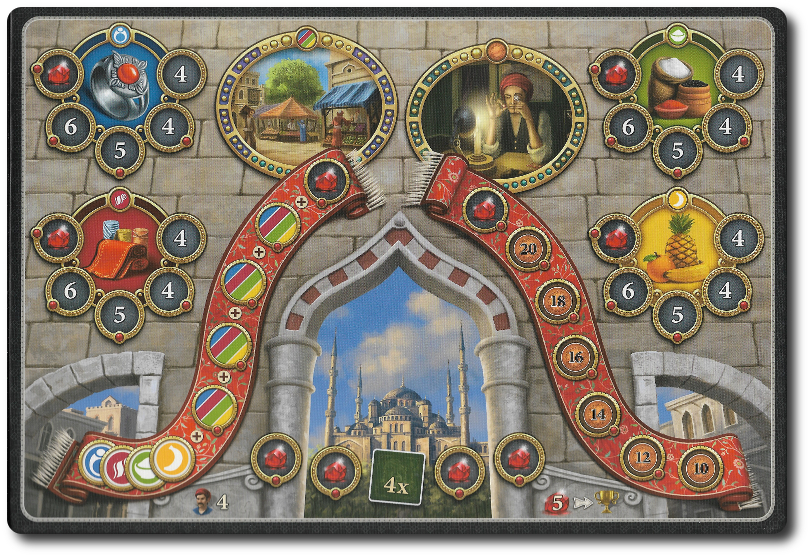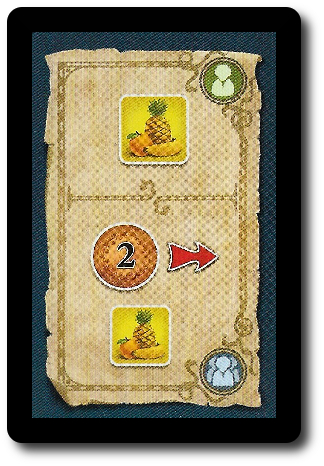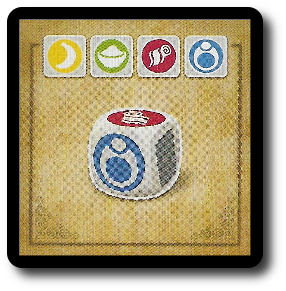
The Basics:
- For ages 10 and up (publisher suggests 14+)
- For 2 to 4 players
- Approximately 30 minutes to complete
Geek Skills:
- Counting & Math
- Logical & Critical Decision Making
- Pattern/Color Matching
- Strategy & Tactics
- Hand/Resource Management
Learning Curve:
- Child – Easy
- Adult – Easy
Theme & Narrative:
- Invest wisely in the future (i.e. “your next turn”)
Endorsements:
- Gamer Geek approved!
- Parent Geek approved!
- Child Geek approved!
Overview
American economist, George Reisman, said “Whoever claims that economic competition represents ‘survival of the fittest’ in the sense of the law of the jungle, provides the clearest possible evidence of his lack of knowledge of economics.” In this game, the strong will not win, but the smart will and so will the patient. Prices will change as demand stays steady and goods become limited. You don’t need to be lion to survive in this jungle, but don’t be sheepish when it comes to making tough choices.
Istanbul: The Dice Game, designed by Rüdiger Dorn and published by Alderac Entertainment Group (AEG), is comprised of one game board, 42 Goods markers, 36 Coin tokens (in the values of one, five, and ten), nine Dice Assistants (customized six-sided die), 33 Bazaar cards, 24 Mosque tiles, 31 Rubies, 12 Crystals, and four Action Summary Aid cars. The cards are as thick and as durable as your standard playing card. The game board, markers, tokens, and tiles are made of solid cardboard. The Gems and Crystals are made of little bits of colored plastic, making it look like the player is using uncut precious jewels. The dice feel a bit light, but do the job. Taken as a whole, the game is of excellent quality.
Opening the Bazaar
To set up the game, first place the game board in the middle of the playing area. There are two sides to the game board. The side to be used (face-up) depends on the number of players in the game.

Second, place Rubies (red) on each of the circular spaces on the game board that have a small red dot. Depending on the number of players, some of the spaces will be left empty. Any Rubies not used should be returned to the game box.
Third, shuffle the Mosque tiles and place them in a stack, face-down. This is the Mosque tile draw stack for the duration of the game. From the draw stack, flip over the first six, placing them face-up in row next to the game board.
Fourth, shuffle the Bazaar cards and place them face-down in a stack next to the Mosque tile draw stack. This is the Bazaar draw deck for the duration of the game.
Fifth, place the Dice Assistants, Coin tokens, Goods markers, and Crystals into small separate piles off to one side of the game playing area. This is the supply pool.
Sixth, give each player one Action Summary Aid card and one Crystal from the supply. Determine who will go first and give them five of the Dice Assistants. The other Dice Assistants should remain in the supply for now. Give to the second player (in turn order sequence) one Coin, the second player two Coins, and the third player three Coins.
That’s it for game set up. The first player has already been selected and the game can begin.
Visiting the Bazaar
Istanbul: The Dice Game is played in rounds and turns with no set number of rounds per game. A player’s turn is summarized here.
Step One: Collect Income
As the game progresses, players might decide to invest in Mosque tiles that provide resources. These are taken from the supply and drawn from the Bazaar draw deck. If a Bazaar card is drawn, it’s immediately resolved and then discarded. A Bazaar card has two sections. The top section displays the action that must be resolved for the player who drew the card. The bottom section displays the action that can be resolved for the player’s opponents.
For example, the following card will give the player who drew it one yellow Goods marker for free (taken from the supply). The player’s opponent’s have an opportunity to buy the same Goods marker for two Coins, but only at this very moment. Once the Bazaar card is discarded this fire sale (for, apparently, fruit) is gone!

Step Two: Roll Dice
Time to put your bumbling, if not loyal, assistants to work. Each player will be given five Dice Assistants to roll, be default. Depending on the Mosque tiles they have in play, they could have up to nine. All the dice the player has available to them are now collected and rolled. If the player has any Crystals, they may discard one to the supply to re-roll any die of their choice. This can be done as many times as the player likes on their turn if the player has Crystals to spend.
Step Three: Take Actions
The dice values rolled determine the actions the player can take on their turn. What actions are available to them can be referenced by using the handy Action Summary Aid card. Each die can only be used once, but the player can decide how the dice are used, matching them into different sets that provide different actions. The same actions can be taken multiple times. A player can only take two actions on their turn normally, but if they have the right Mosque tiles, they can take more.
Actions include, but are not limited to, collecting Goods markers, collecting Rubies, collecting Crystals, drawing Bazaar cards, collecting Coins, and buying Mosque tiles. If a Bazaar card is drawn, it’s immediately resolved. Collected Goods markers, Rubies, Crystals, and Coins are taken from the supply or game board and placed in front of the player who collects them. When taking Rubies, the cost will change as the game progress, with the cost being determined by the game board spaces. If at anytime a player is unable to collect Coins, Goods markers, or Crystals from the supply, all of the players must discard one of the missing resources back into the supply. Then the resource is collected. To put it another way, hording resources is not a great strategy.
As the Rubies become less available from the game board, they become more expensive. Goods markers can be used like dice, with the value of the Goods marker representing the possible dice rolls.
Only the visible Mosque tiles are available to the player if they want to invest in them. The cost of the Mosque tile is listed at the top of the tile, indicating the type and number of each die value/resource required. If the player can pay it, the Mosque tile is collected and placed in front of the player. On the player’s next turn, the Mosque tile will provide the resource shown. A new Mosque tile is then drawn and replaces the previously collected Mosque tile.
For example, the following Mosque tile can be purchased (if it’s available) for four different resources. If the player can purchase it, they get to add an additional Dice Assistant to their roll on their next turn.

Step Four: End Turn
After the player has taken their actions (or ends their turn early because they don’t want to complete any additional actions), they take five of the Dice Assistants and pass them to the next player in turn order sequence.
This ends the player’s turn. The game continues with the next player taking the same steps as noted above. Once all players have taken a turn, the round ends and a new round begins.
Ruby Rewards and Victory
The game continues until one player ends their turn with the required number of Rubies (the number needed depends on the numbers of players). The round is completed, meaning all players have the same number of turns in the game. Once the round ends, the game ends. The player with the most Rubies wins the game. If there is a tie, the players sell their Goods markers for three Coins each and their Crystals for two Coins each. The tied players with the most Coins wins the game.
To learn more about Istanbul: The Dice Game, visit the game’s web page.
Final Word
 The Child Geeks like dice games. Actually, any game where they can pick up and drop something on the table seems to always keep their interest. And here I must add a word of caution. The bits on the game board are holding meaningful positions. Do not let the dice upset the game board. If Rubies go shifting thanks to a die bouncing on the game board, you’ll have ruined your game. That being said, it only happened once and once was enough to teach the Child Geeks a valuable lesson in “dice control”, which isn’t really a thing, but you get my point. According to one Child Geek, “I really liked the game. I liked how you could get good deals by using the tiles to make sure you are less interested in the dice.” Well, not “less interested”. More like “less dependent”. Which is true. Another Child Geek said, “The game is fast and fun. I like seeing how others use the dice.” There is downtime in the game, but the dice rolls and quick actions make the time between turns fairly short. A real plus for the Child Geeks. By the time the bazaar closed, the Child Geeks all voted to approve Istanbul: The Dice Game.
The Child Geeks like dice games. Actually, any game where they can pick up and drop something on the table seems to always keep their interest. And here I must add a word of caution. The bits on the game board are holding meaningful positions. Do not let the dice upset the game board. If Rubies go shifting thanks to a die bouncing on the game board, you’ll have ruined your game. That being said, it only happened once and once was enough to teach the Child Geeks a valuable lesson in “dice control”, which isn’t really a thing, but you get my point. According to one Child Geek, “I really liked the game. I liked how you could get good deals by using the tiles to make sure you are less interested in the dice.” Well, not “less interested”. More like “less dependent”. Which is true. Another Child Geek said, “The game is fast and fun. I like seeing how others use the dice.” There is downtime in the game, but the dice rolls and quick actions make the time between turns fairly short. A real plus for the Child Geeks. By the time the bazaar closed, the Child Geeks all voted to approve Istanbul: The Dice Game.
 The Parent Geeks, especially the casual and less experienced players, found a good deal of enjoyment from the game, but not at first. According to one Parent Geek, “When you first play this game, it is difficult to determine what you should focus on. After you start filling in some holes by buying tiles, you start to see the path you should have taken from the start.” Which can be said for pretty much any game, but I get what the Parent Geek is saying. Players have little in the way of buying power, but unlimited buying potential. Players must work to make their turns as worthwhile as possible by purchasing the right economic tools to improve their economic power. As one Parent Geek put it, “The worst part of this game is waiting for your turn when you know you can buy a Ruby and pray to the board game gods that your opponents don’t buy it first!” Yep, waiting for your turn when you see a juicy Ruby on the market for a price you can afford is hell. When all the Rubies were purchased, the Parent Geeks voted to approve the game.
The Parent Geeks, especially the casual and less experienced players, found a good deal of enjoyment from the game, but not at first. According to one Parent Geek, “When you first play this game, it is difficult to determine what you should focus on. After you start filling in some holes by buying tiles, you start to see the path you should have taken from the start.” Which can be said for pretty much any game, but I get what the Parent Geek is saying. Players have little in the way of buying power, but unlimited buying potential. Players must work to make their turns as worthwhile as possible by purchasing the right economic tools to improve their economic power. As one Parent Geek put it, “The worst part of this game is waiting for your turn when you know you can buy a Ruby and pray to the board game gods that your opponents don’t buy it first!” Yep, waiting for your turn when you see a juicy Ruby on the market for a price you can afford is hell. When all the Rubies were purchased, the Parent Geeks voted to approve the game.
 The Gamer Geeks liked the game, but found it a bit bland. According to one Gamer Geek, “A solid game and I’d suggest it to anyone as a good filler. The problem I have with it is that I don’t feel all that excited about my turns. I like how I can make a strong economic machine, but I don’t get any feeling of a rush by doing so. More like a general feeling of satisfaction of playing smart. Kind of like the feeling you get when you use coupons at the grocery store to get a really good deal.” The Gamer Geeks also felt that the last player in turn order sequence had too big of a starting advantage with the extra Coins at their disposal, but they also agreed that the advantage was very short-lived. As one Gamer Geek put it, “Victory in this game goes to the player who makes the smart choices and works to create shortcuts in the market by moving away from the dice.” When all the votes were in, the Gamer Geeks voted to approve Istanbul: The Dice Game. While they all collectively found it to be a bit dry, they also agreed it challenged them.
The Gamer Geeks liked the game, but found it a bit bland. According to one Gamer Geek, “A solid game and I’d suggest it to anyone as a good filler. The problem I have with it is that I don’t feel all that excited about my turns. I like how I can make a strong economic machine, but I don’t get any feeling of a rush by doing so. More like a general feeling of satisfaction of playing smart. Kind of like the feeling you get when you use coupons at the grocery store to get a really good deal.” The Gamer Geeks also felt that the last player in turn order sequence had too big of a starting advantage with the extra Coins at their disposal, but they also agreed that the advantage was very short-lived. As one Gamer Geek put it, “Victory in this game goes to the player who makes the smart choices and works to create shortcuts in the market by moving away from the dice.” When all the votes were in, the Gamer Geeks voted to approve Istanbul: The Dice Game. While they all collectively found it to be a bit dry, they also agreed it challenged them.
 There is little in the way of “excitement” in this game. The players will have to make decisions, most certainly, and those decisions will impact future turns. But there is zero risk to be found in Istanbul: The Dice Game. Without risk, each roll is safe. Each choice is safe. The only thing the player “risks” is the inevitable pain of hindsight. For some of our players, that was a bit of a turn off.
There is little in the way of “excitement” in this game. The players will have to make decisions, most certainly, and those decisions will impact future turns. But there is zero risk to be found in Istanbul: The Dice Game. Without risk, each roll is safe. Each choice is safe. The only thing the player “risks” is the inevitable pain of hindsight. For some of our players, that was a bit of a turn off.
The player choices are not always obvious, but they are limited. The dice determine the possibilities and the player mixes and matches the dice rolled results accordingly. Crystals and Goods markers help here, offsetting bad rolls and allow the player to take more control of what can be done on their turn. To put it another way, the player is held hostage by the dice at first, but through smart purchases, the player’s turn will become more efficient. This makes the dice a starting point, but not the final deciding factor.
And that is really the point of Istanbul: The Dice Game. Efficiency. The game plays very fast, so it’s in the player’s best interest to get their economic machine up and purring as quickly as possible. This is done by purchasing Mosque tiles, which provides resources, which can be used in turn to offset dice rolls and provide economic strength in the market. The only true goal is purchasing Rubies and if the player doesn’t realize that from the start, they’ll spend their time investing in areas that have no impact to the game’s victory condition. When playing Istanbul: The Dice Game, players must be shrewd. Each turn is an opportunity that should not be wasted.
As market games go, this is a good one for a filler. It’s light, strategy and tactics are necessary (to a point), and there are interesting choices to be made. I was concerned, at first, that the dice would add in randomness. If players were forced to use what they rolled, that would certainly be the case, but players can adjust the dice and include values not shown. This makes the dice a random starter, providing the player different resources to ponder using, chucking, or adjusting each round. As I mentioned, this game never felt exciting, but it was always interesting. Each turn started differently, despite the goal of each turn being the same.
I really enjoyed Istanbul: The Dice Game. It’s a light filler for the gaming elitists and a fun full game for the casual players. The time spent at the table feels right and there is a lot of replayability thanks to the dice, Bazaar cards, and Mosque tiles being randomized. You will always know what you can get in the bazaar, but not when it will be available. Players need to be on their toes, think ahead, and purchase aggressively if they hope to win. Do give Istanbul: The Dice Game a try when you have a chance.
This game was given to Father Geek as a review copy. Father Geek was not paid, bribed, wined, dined, or threatened in vain hopes of influencing this review. Such is the statuesque and legendary integrity of Father Geek.
Discover more from Father Geek
Subscribe to get the latest posts sent to your email.





